Conducted by comScore and commissioned by Expedia Media Solutions, a study published last week analyzes the importance of desktop, tablets and smartphone devices in online travel content consumption. Titled Travel Decisions in a MultiScreen World, the study provides an in-depth look at device usage and trends, research and booking habits, and unique behaviors across audience segments.
Some very interesting findings that confirm how urgent it is becoming for travel and hospitality stakeholders to embrace mobile! The following are a few key insights I wish to highlight.
156M People Engage Specifically with Travel Content
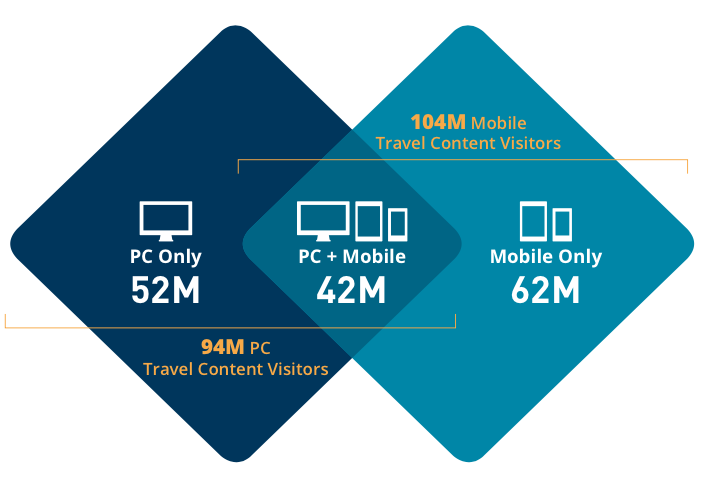
With an 11% year-over-year increase, there are now 156M people who engage specifically with travel content in the US. What may seem surprising, however, is to find out that for the very first time, there are more people now consuming travel content from mobile devices (smartphones and tablets) than from desktop computers! More specifically, here is how the 104M mobile travel content visitors are spread:
- Tablet Only: 14M
- Smartphone Only: 80M
- Both: 10M
PC is Still King… For Now
While there may be more people consuming travel content from mobile devices, not all user visits are equal. PC remains king in terms of travel minutes spent online, but mobile is closing the engagement gap with a 7 points year-over-year increase between 2013 and 2014, even though overall travel minutes actually decreased during that same period, from 5.4 to 5 billion minutes.
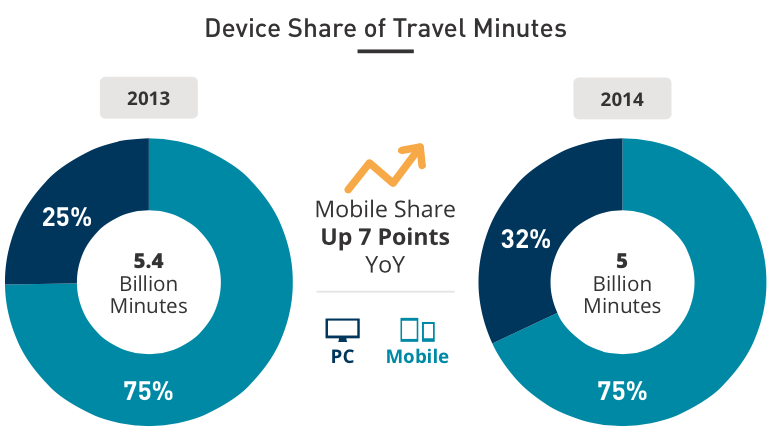
In fact, another surprising finding from this study shows that, in 2014, 40% of travel audiences are now mobile only. This echoes recent findings from a different PhoCusWright study predicting that more than 50% of online travel-related search will come from mobile devices in 2015, in the United States.
Nevertheless, PC users still spend twice as many total minutes as mobile users on travel sites, so an efficient digital strategy needs to encompass all devices, rather than focus on desktop or mobile alone.
Mobile Audience Grows Across Travel Categories
Contrary to popular belief, mobile user visits are happening and growing across all travel categories, not just airlines or hotels. It’s also interesting to note how growth drivers vary between tablets and smartphones, for example with airlines mobile audience growing by 72% on the former, but only by 7% with the latter.
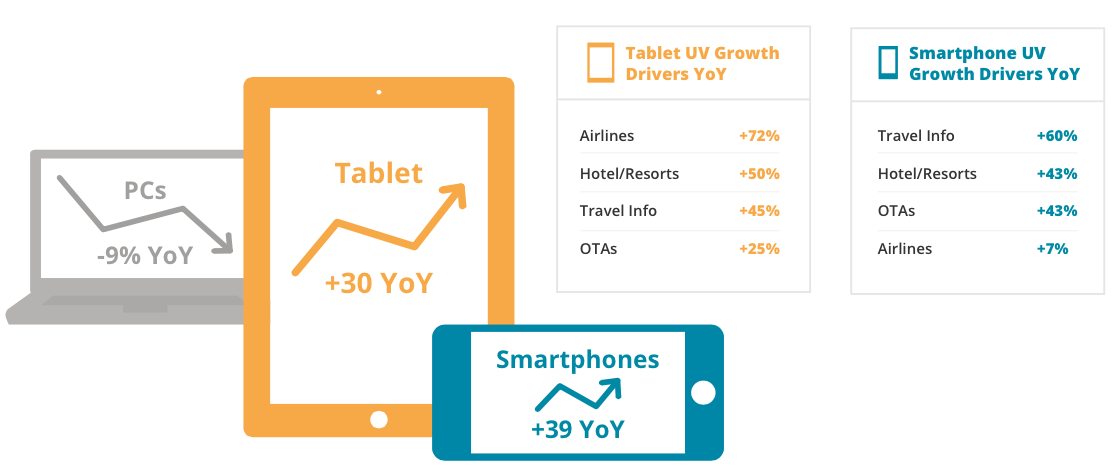
Mobile Bookings Span All Lines of Travel
Mobile bookings span all lines of travel, yet air and hotel bookings combined account for more than 70%. Having said that, the study also found that while mobile bookings are at 6% of the market, over 70% of travelers are engaging with content via their mobile devices on a monthly basis.
Thus, mobile bookings will continue to grow – most who have booked on mobile will again, many who have yet to book on mobile intend to in the future!
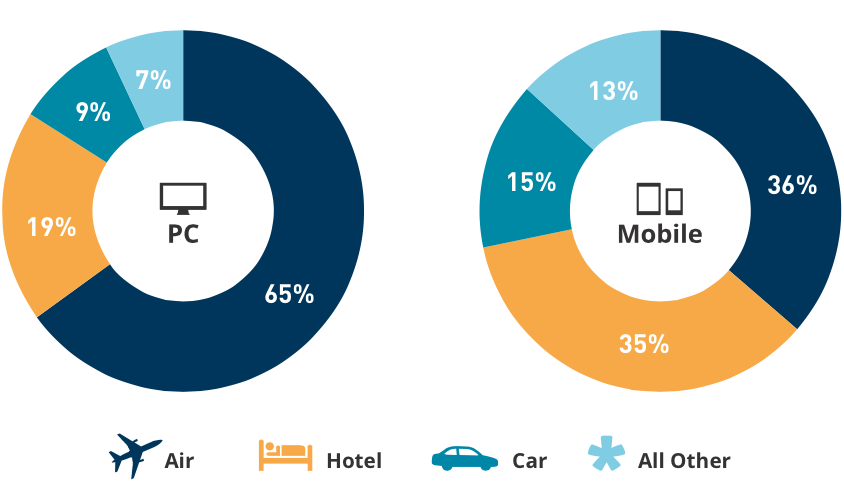
Usage Varies Slightly According to Planning Stages
Family, Budget, Luxury and Business travelers exhibit unique usage and booking habits across devices but, unsurprisingly, PC usage remains high for all groups during the planning stages of travel: researching destinations, shopping for transportation & accommodation, planning trip activities, and during the trip itself.
- Across all groups, at least 82% used a PC to research destinations; outside of the planning stages, 52% of Business travelers and 40% of Budget travelers used a PC during their trip for travel related info.
- Luxury and Business travelers use their smartphones to engage with travel content pre-trip more than other groups; 43% of Business travelers researched destinations and 40% of Luxury travelers shopped for air/hotel and planned trip activities.
Different strokes for different folks
Different kinds of travelers don’t necessarily use devices in the same way, as can be expected. Luxury travelers are thus more likely to book travel on a mobile device, while business travelers plan to use phones and families mostly plan to use tablets.
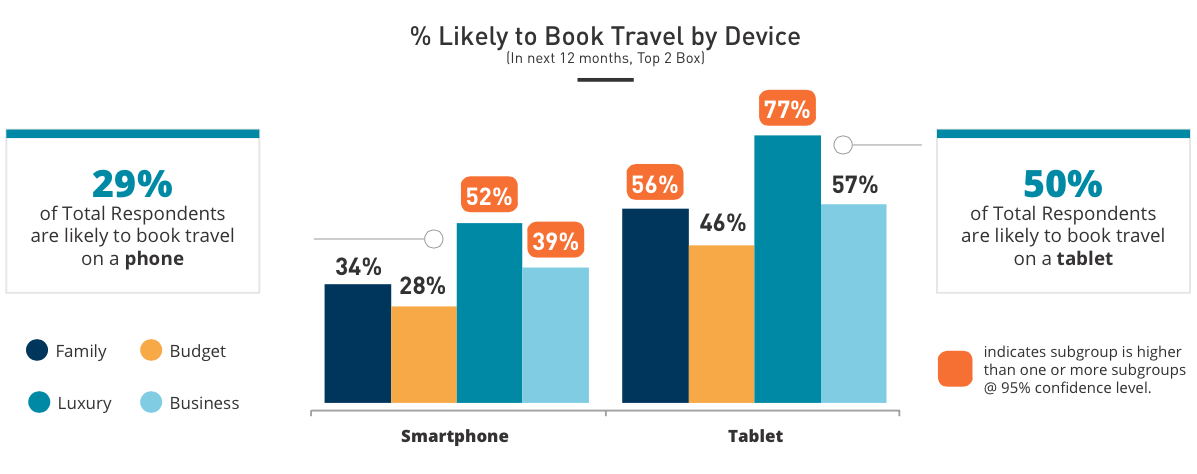
Other Findings
Content consumption and engagement varies by platform, but travelers now expect a seamless and relevant experience regardless of the device. Optimizations such as leveraging visual-rich content, responsive design and targeted ads can help drive mobile ad clicking. This means:
- When using a mobile device to research destinations, shop for air/hotel or plan trip activities, at least 37% of tablet users and 34% of smartphone users said they used the device because mobile sites are easy to navigate;
- Of the 104 million people engaging with travel content on a mobile device, 92% are using a mobile browser to do so;
- 22% of travelers intentionally engage with ads on mobile; 45% of Luxury travelers intentionally clicked on a smartphone ad and 43% of Business travelers intentionally clicked on a tablet ad;
- Across both tablet and smartphone, the top reason for clicking on a mobile ad was because it caught the user’s attention; 47% on tablet and 44% on smartphone. Additional reasons for clicking included exposure to an offer, product or service the user was interested in.
Do any of these travel marketing findings surprise you? Let me know in the comments section below. Cheers!









Leave a Reply